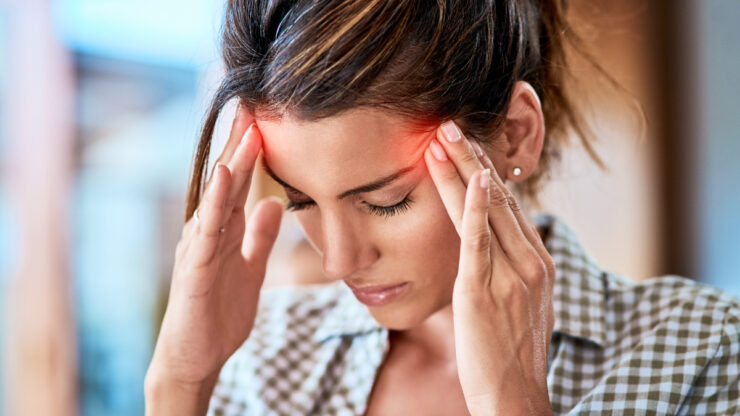Migraine is considered as a disorder that causes headaches and is neurological in nature. It causes vomiting and sensitivity to light and sound.
Until now, doctors cannot pinpoint the exact cause of these headaches. But have associated it with the brain’s blood flow changes and have linked it to a person’s genes.
Doctors think headaches start due to overactive cells that trigger the nerves, giving pulse-like sensations to the head and face. When a migraine is at the starting stage, people like to lay alone on a bed in a dark room with a cold towel on their face. Some might even know this is the onset of an attack.
Every person has different triggers affecting them. But some common patterns may affect the majority of people who have migraines. Migraines could be triggered by almost anything. It sometimes becomes challenging to identify the exact trigger, as a combination of things will start it.
It is always advisable to maintain a headaches chart, which will help the doctors know how frequently it occurs, as it will be easy to analyze and give an effective solution to the patients.
How To Manage Migraine Trigger Symptoms
Stress Is A Leading Factor

Stress is the main factor in triggering headaches, eventually leading to migraines. When stressed, the brain releases chemicals that cause the blood vessels to swell, eventually leading to headaches.
Studies have found that stress is significantly linked to inducing attacks in people. Since tension and migraine go hand in hand, it becomes a never-ending cycle if not treated.
Managing The Symptom
Always make a list of things that cause stress which leads to tension, and then try reducing it. Meditation, exercise, and proper sleep are beneficial, as they change the body’s physiological responses, reducing the stress that triggers attacks.
Improper Sleep Schedule
Sleep could restore many symptoms, including those that affect the brain. Hence if having an improper sleep schedule could lead to headaches. Most severe attacks occur early morning before sunrise and extend a few hours, thus depriving people of their sleep.
Managing The Symptom
Always get into bed at the same time and try to get sleep for eight hours. Avoid television, mobile, and reading during bedtime and avoid sleep during day time.
Changes In Hormones
Medical studies clearly show that women are more likely to get migraines than men. Almost three fourths of women get attacks during their menstrual period. It is also known as menstrual migraine, which occurs in women during their menstrual cycle due to changes in their hormone levels.
Managing The Symptom
Changing diet and lifestyle will help. It is always advisable to meet a headache specialist and a gynecologist to get the proper treatment.
Consumption Of Caffeine And Alcohol

Consumption of caffeine activates the symptoms in people. But few have claimed that the consumption of coffee stops headaches. There are medicines containing caffeine that help to overcome the pain.
Studies have shown that alcohol consumption could trigger symptoms of migraine in people.
Managing The Symptom
Never drink beyond limits. Always know the limit when consuming alcohol. If the symptoms of pain start after the consumption of alcohol, then it’s time to take the medication.
Weather Is A Culprit
Hot weather and storms are everyday things that start weather-related migraine. The heat leads to dehydration in the body, thus triggering the attack.
Managing The Symptom
No one controls the weather. If the climate is unfavorable, staying indoors and changing the day’s schedule is better for coping with the temperature more efficiently.
Consumption Of Food

Some foods trigger headaches. Products like chocolate, cheese, and dairy products could also start it.
Managing The Symptom
Always avoid foods that trigger headaches. Many adopt a migraine diet that helps in overcoming the attack. Always have food on time.
Dehydration Of Body
Dehydration could also trigger an extreme headache. It affects the whole body, causing dizziness, and could also be a medical emergency.
Managing The Symptom
Always hydrate your body with water. Check the daily fluid intake. Sometimes, just drinking water helps in stopping the attack.
Natural Light
Many migraine patients do not like facing natural sunlight. They have photophobia which, in a few cases, is the cause of headaches. People with this condition do not want to come outside their homes or offices.
Managing The Symptom
Sunglasses will be of immense help to cope with sunlight. Always wear it when going outside.
Strong Odors
Strong odors or smells sometimes trigger the attack or even make them worse. It is a common symptom.
Managing The Symptom
Avoiding the strong smell of chemicals, perfumes, and food could help. If working in an office, tell colleagues about the condition as they can help.
Over Medication

If taking migraine medicine for two weeks, it could increase headaches. It is called MOH (Medication Overuse Headache)
Managing The Symptom
If having MOH, it is better to stop taking the medication and wait until it is cleared fully out of your body. Always take the help of the doctor when needed.
Conclusion
Persons having these attacks will have different triggers that start them. Never shy away from meeting a doctor or a headache specialist, as they are the only ones who can diagnose and treat the symptoms effectively.
Keeping a migraine diary will help find the reason behind these attacks, as it will enable recognizing the body’s warning signs. There might be a pattern of events before an attack, and a migraine diary will help in knowing it.
Presently in the market, new devices are there to prevent these attacks. A headband gadget called Cefaly is a device that sends an electric pulse to the head. It gives tingles and a massage sensation to the nerves that cause migraine.
Another device, named Gamma Core, sends electrical signals to the nerves in the neck to relieve the pains caused by headaches.

